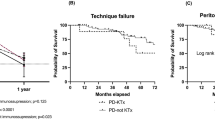Summary
Patients with chronic kidney-graft failure who are starting peritoneal dialysis (PD) treatment need special consideration. The question of whether mortality is higher in these patients than in those who have not received a transplant is controversial. However, some studies suggest that differences in mortality between these groups are mainly explained by variations in age, duration of dialysis and comorbidity. One study showed similar survival between patients with chronic graft failure treated with hemodialysis (HD) and those on PD, but there is some evidence that residual renal function in PD patients with chronic graft failure declines faster than in PD-patients without transplants. Until now there have been no data on whether PD has a positive influence on the course of residual renal clearances compared with the influence of HD. The fact that PD patients with transplants show significantly higher peritoneal transport rates than patients without transplants may have an influence on technique survival. In patients with chronic graft failure, the type and dose of immunosuppressive therapy, as well as its influence on the incidence of acute rejections, residual renal function and infection rates, are also controversial. Immunosuppressive therapy may preserve residual graft function, but these patients have a higher risk of Gram-negative peritonitis, a shorter interval between start of dialysis and first episode of peritonitis, and a higher risk of catheter infections with Staphylococcus aureus than PD patients without transplants. In conclusion, PD is an acceptable treatment option for patients with chronic kidney-graft failure provided that the above clinical aspects are considered (e.g., intensified monitoring of infections and residual renal function).
Zusammenfassung
Nierentransplantierte Patienten, die aufgrund irreversibler Transplantatinsuffizienz wieder dialysepflichtig werden, stellen eine besondere Gruppe an der Peritonealdialyse (PD) dar. Die Frage, ob diese Patienten im Vergleich zu nicht transplantierten Patienten ein reduziertes Überleben haben, wird unterschiedlich beantwortet. Für Mortalitätsunterschiede zwischen den Gruppen scheinen aber eher das Alter, die Dialysedauer und die damit verbundene höhere Komorbidität verantwortlich zu sein. Eine Studie, die den klinischen Verlauf bei Patienten mit Transplantatversagen an der Hämodialyse (HD) und an der PD verglichen hat, fand keinen signifikanten Überlebensunterschied zwischen den beiden Gruppen. Mehrere Studien zeigen einen schnelleren Rückgang der Nierenrestfunktion bei PD-Patienten mit chronischer Transplantatinsuffizienz im Vergleich zu nicht transplantierten Patienten. Ob die PD aber im Vergleich zur HD bei chronischer Transplantatinsuffizienz den Verlauf der renalen Clearance günstig beeinflusst, ist bisher noch nicht untersucht worden. Die bei transplantierten im Vergleich zu nicht transplantierten PD-Patienten nachweisbaren höheren peritonealen Transportraten könnten das technische Überleben beeinflussen. Die Frage nach Art und Ausmaß der Immunsuppression bei chronischer Transplantatinsuffizienz und die möglichen Auswirkungen auf Abstoßung, längeren Erhalt der Nierenrestfunktion und Infektionsrate wird kontrovers diskutiert. Immunsupprimierte transplantierte Patienten haben ein erhöhtes Risiko für gramnegative Peritonitiden, ein kürzeres Zeitintervall vom Beginn der Dialyse bis zum Auftreten der ersten Peritonitis, aber auch ein erhöhtes Risiko für Staphylococcus-aureus-Katheterinfektionen im Vergleich zu nicht transplantierten und zu diabetischen PD-Patienten. Zusammenfassend kann die PD aber unter bestimmten Voraussetzungen (z.B. engmaschiges Infekt-Monitoring) auch bei Patienten mit chronischem Transplantatversagen als Nierenersatztherapie durchgeführt werden.
Similar content being viewed by others
Author information
Authors and Affiliations
Corresponding author
Rights and permissions
About this article
Cite this article
Puttinger, H. Peritoneal dialysis in patients with chronic kidney-graft failure. Wien Klin Wochenschr 117 (Suppl 6), 35–39 (2005). https://doi.org/10.1007/s00508-005-0493-x
Issue Date:
DOI: https://doi.org/10.1007/s00508-005-0493-x




